Yves GARY Hits: 4968
Category: 1920 : CHALLENGE N°13
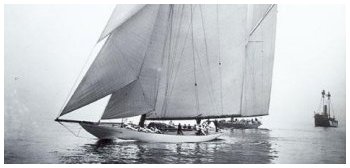 Resolute Wins Third Race. Yachts sail dead head but Handicap Gives Cup Defender the Victory
Resolute Wins Third Race. Yachts sail dead head but Handicap Gives Cup Defender the Victory THURSDAY, JULY 22, 1920 - The Atlantic ocean melodrama did not have the gallery that saw the two fiascos outside the channel.
THURSDAY, JULY 22, 1920 - The Atlantic ocean melodrama did not have the gallery that saw the two fiascos outside the channel.
The attendant boats were greatly diminished in number. The Highlander, which, carried members of the New York Yacht Club, was missing, and the little fleet of fishing boats seemed to have come the conclusion that there were no more thrills in yacht racing and resumed fishing.
 The official aerial fleet was just as numerous as ever. One impudent airplane dove clown too close to the yachts and seemed to be joy-riding all over the ocean until the air was filled with wireless reprimands and the offender slunk off to the shore in disgrace.
The official aerial fleet was just as numerous as ever. One impudent airplane dove clown too close to the yachts and seemed to be joy-riding all over the ocean until the air was filled with wireless reprimands and the offender slunk off to the shore in disgrace.
The navy blimp NC-10 pottered around above in the same aimless fashion, while the businesslike torpedo destroyers went about their heats methodically. There was no cluttering of the course by impulsive craft. The greatest race of them all found a half-emptied sea theater. The interest seemed rapidly on the decline.
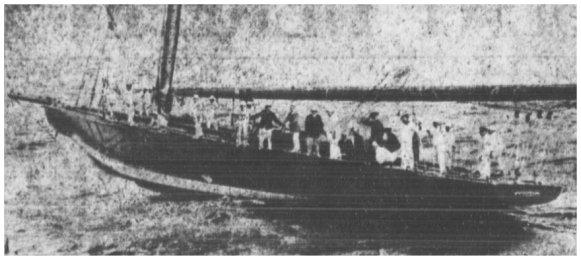 Working out to the Ambrose light there did not seem to be the sign of a breeze and the start was postponed for an hour while the two yachts drifted about among the lolling destroyers and revenue boats. Then there seemed to be just a zephyr from the southwest and a start was called.
Working out to the Ambrose light there did not seem to be the sign of a breeze and the start was postponed for an hour while the two yachts drifted about among the lolling destroyers and revenue boats. Then there seemed to be just a zephyr from the southwest and a start was called.
Shamrock shot across the mark first with cumbersome eagerness into the wind and it seemed the skipper of the challenger tried to blanket the defender to throttle the dainty windpipe of Resolute right at the start. But the ancient trick cost him the lead, for he was back-winded and Resolute pushed out into the lead.
Then followed a series of tacks and feints at tacks until the boats looked like a pair of exaggerated insects in combat as they sparred for an opening on the surface of the sea. The breeze began to freshen and the racers bore off to the Jersey shore in the direction of Deal Beach, heeling more and more as the breeze gradually strengthened. The skipper of Shamrock pointed farthest shoreward.
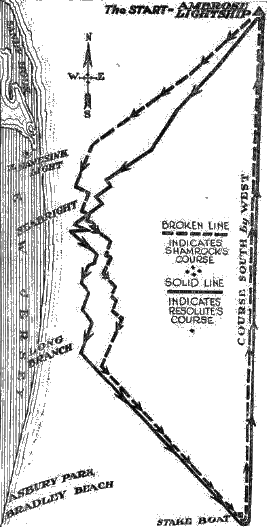 As they worked over to a point off Long Beach they bore close together and again they feinted and fenced. Suddenly Resolute shot across and performed that feat of nautical jiujitsu, which is known as blanketing. The sails of Shamrock were all but empty of wind as the result of the maneuver. The skipper of Shamrock tried no more of this jockeying. The challenger bore in shore, while Resolute coaxed her way forward against the wind, gaining inch by inch and foot by foot as every succeeding tack denoted.
As they worked over to a point off Long Beach they bore close together and again they feinted and fenced. Suddenly Resolute shot across and performed that feat of nautical jiujitsu, which is known as blanketing. The sails of Shamrock were all but empty of wind as the result of the maneuver. The skipper of Shamrock tried no more of this jockeying. The challenger bore in shore, while Resolute coaxed her way forward against the wind, gaining inch by inch and foot by foot as every succeeding tack denoted.
Resolute became dim against the misty background out to sea, while Shamrock lumbered sullenly far in her light green wake. They heeled till their decks were running with water, for the breeze was steadily freshening as they worked out toward the open ocean.
At 3 o'clock the distance between the two racers had widened to about two fifths of a mile, and Resolute was coaxing her way against the wind that seemed to press back against the challenger. By this time both were heading for the mark that glistened against the black hull of the Morgan yacht Corsair. The wind was freshening steadily and there were splashes of white on the swiftly running seas.
By this time the watchers began to realize that there would actually be a race. Not only that, but it promised to be the liveliest race of the series. The destroyer Semmes, traveling in the wake of Shamrock, had to hit it up to ten knots to keep up with the yachts, and the men who worked with steam began to take an interest in the craft that went by power of the wind pressing against the canvas.
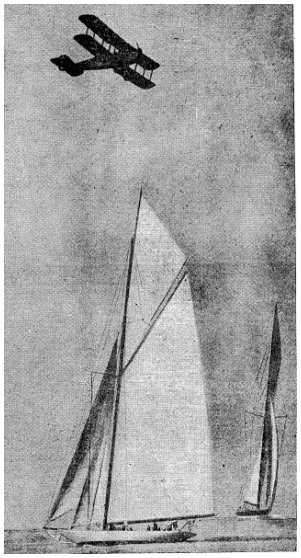 Resolute Sweeps Like Falcon
Resolute Sweeps Like FalconHeeling over at a dizzy angle, Resolute swept up to the mark like a falcon swooping after its quarry. It swept around the glistening buoy with a rush of wings and pointed homeward bound. Then came the shifting of the canvas with the beautiful swiftness and regularity which has marked the handling of the American yacht, superficially at least.
Only for one brief instant the long white spinnaker seemed to hold and the watchers began to murmur that some of the ill-luck that happened to the sails of Shamrock on the previous day might befall the defender. But the spinnaker broke out and tilled with a snap. Then the balloon jib shot out and the defender was set for the dash home wing and wing, a great white bird with a glistening spread of wings, for just at this instant the sun flashed out in full to give the proper highlights to the picture.
Shamrock came up to the mark clumsily but with a rush of speed, and began to break out her huge set of canvas. The big overgrown spinnaker shot out and went taut in an instant. The balloon jib unfolded more slowly and Shamrock was set for the vain but stubborn task of killing that time allowance.
Shamrock already had demonstrated that with the wind behind she could bear down on the defender relentlessly and steadily. It was a foregone conclusion that Shamrock would make up the distance and more but not the time unless there was an accident such as there was last Thursday, when Resolute lost the first race as her throat halyards broke.
They were talking about this on all of the attendant boats as Shamrock sped on her clumsy way before the wind. The snapping of one of those slender spars of Resolute might mean the end of the America's Cup as an American trophy and a long battle to bring it back. The parting of one of those thread-like ropes might cause the collapse of that beautiful canvas drapery, and the series would end with the loss of the cup.
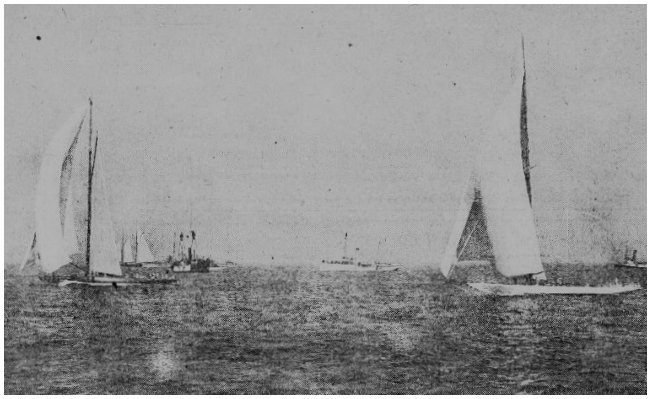 Will she hold? they asked. The wind was almost as heavy as it was on the first day when Resolute collapsed with a lead that would have won a victory without a time allowance. The heavier looking Shamrock IV bulked big enough to carry all that exaggerated spread of canvas, but Resolute looked so dainty and frail as she cut the water! The big green sloop was gaining momentum all the time and the mark was hidden again by the mists.
Will she hold? they asked. The wind was almost as heavy as it was on the first day when Resolute collapsed with a lead that would have won a victory without a time allowance. The heavier looking Shamrock IV bulked big enough to carry all that exaggerated spread of canvas, but Resolute looked so dainty and frail as she cut the water! The big green sloop was gaining momentum all the time and the mark was hidden again by the mists.
When Captain "Bully" Norton, of the destroyer Semmes, announced that the last leg was half completed the wind seemed to die gradually again. It dropped several knots in the space of several miles and the big green boat closed in steadily. But by that time it seemed clearly evident that the race was won by Resolute in time allowance, but never boat by boat.
Although the watchers knew that the forging of Shamrock across the mark ahead would not mean a victory, they could not but feel an interest in the picture that she made. It was like watching a game fighter beaten at the start, but putting up a fight that was a fight.
Each of the boats carried everything that would catch the air. There was no maneuvering to be done. The wind was behind and the mark was dead ahead.
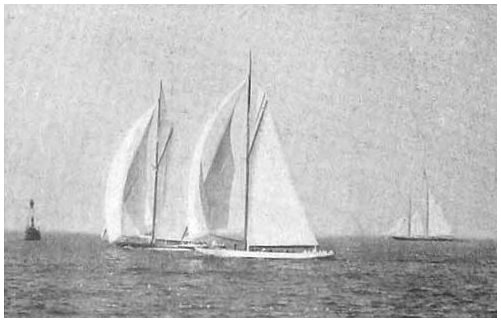 With the result as clear as though ''Resolute Wins" was already flaring in the headlines, they gathered on the decks of the attendant boats to watch the passing of the defender by the challenger. It was like watching a motion picture that ought to thrill, that was meant to thrill. But picture do not count in the face of realities.
With the result as clear as though ''Resolute Wins" was already flaring in the headlines, they gathered on the decks of the attendant boats to watch the passing of the defender by the challenger. It was like watching a motion picture that ought to thrill, that was meant to thrill. But picture do not count in the face of realities.
Almost within a mile of the lightship and the waiting craft the passing came, and Shamrock led over the mark by open water, shooting for a point directly in the center of the line between the lightship and the stake-boat. She at least flaunted her ample draperies in the finely chiseled face of Resolute, but it was all futile and almost peevish to look at.
The whistles were roaring and the sirens wore screaming a welcome. Shamrock bore off to port and began to drop the running canvas. It was heaped on her decks as Resolute crossed the line. It seemed that Shamrock must have won on elapsed time by a second or two, but the watches found that the time was exactly the same. Here was the paradox which the landsman never will understand. A dead heat, after thirty miles, and the defender wins by seven minutes and a second.
To the question, a signal, as to whether the yachts would agree to race on the following day, the defender replied that she was ready but Shamrock replied in the negative. Captain Burton decided that she needed a scraping and it was so ordered by Sir Thomas Lipton, whose steam yacht was hovering near the finishing line.
